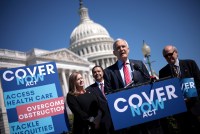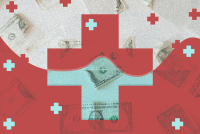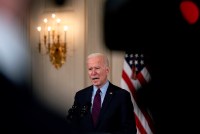Latest KFF Health News Stories
Federal Investigation Into Spine Surgeries Uses Mob Laws to Target Health Care Fraud
Investigators allege a Texas company that arranges spine surgery and other medical care for people injured in car crashes accepted bribes in violation of 1960s-era racketeering law.
Covered California’s Insurance Deals Range From ‘No-Brainer’ to Sticker Shock
Families of four with incomes of less than about $40,000 a year can pay no premiums and have low deductibles. For some others, health insurance in 2022 will cost more than in 2021 — in some cases, significantly more.
New Health Plans Offer Twists on Existing Options, With a Dose of ‘Buyer Beware’
Fueled by consumer frustration with high premiums and deductibles, two new offerings promise a means for consumers to take control of their health care costs. But experts say they pose risks.
Atención primaria directa con un toque de Robin Hood
St. Luke’s Family Practice es una respuesta local a los problemas sistémicos de la sanidad estadounidense, como el agotamiento de los médicos, la insatisfacción de los pacientes y el hecho de que millones de personas sigan careciendo de asistencia.
Direct Primary Care, With a Touch of Robin Hood
Some doctors, sick of mainstream health care’s red tape, are finding refuge in practices that combine concierge medicine with charity care.
Death in Dallas: One Family’s Experience in the Medicaid Gap
Efforts to give 2.2 million Americans health insurance hang in the balance as Congress debates a massive spending bill. The so-called Medicaid gap is felt most acutely in Texas, where about half of those who stand to gain coverage live.
Census: Insured Population Holds Steady, With a Slight Shift From Private to Public Coverage
The Census Bureau on Tuesday released its 2020 findings regarding Americans’ income, poverty and health insurance coverage.
How ERs Fail Patients With Addiction: One Patient’s Tragic Death
Two intractable failings of the U.S. health care system — addiction treatment and medical costs — come to a head in the ER, where patients desperate for addiction treatment arrive, only to find the facility may not be equipped to deal with substance use or, if they are, treatment is prohibitively expensive.
KHN’s ‘What the Health?’: How to Expand Health Coverage
Democrats in Congress and the states are devising strategies to expand health coverage — through the Affordable Care Act, Medicare, Medicaid and a “public option.” But progress remains halting, at best. Meanwhile, lawmakers in Washington may have to agree on how to control prescription drug prices if they wish to finance their coverage initiatives. Alice Miranda Ollstein of Politico, Tami Luhby of CNN and Shefali Luthra of The 19th join KHN’s Julie Rovner to discuss these issues and more. Also, Rovner interviews Michelle Andrews, who reported and wrote last month’s KHN-NPR “Bill of the Month” episode about a very expensive sleep study.
At Texas Border, Pandemic’s High Toll Lays Bare Gaps in Health and Insurance
In Texas’ border communities, which are overwhelmingly Hispanic, covid-19 death rates for people under age 65 were double those in the rest of the state and three times the national average. They were also significantly higher than rates in New Mexico border areas.
Lots of Health Insurance Help in Covid Relief Law — But Do Your Homework First
Democrats’ $1.9 trillion covid relief package will offer some of the most significant help for Americans to pay for health insurance in a decade. But the temporary provisions are complicated. KHN offers tips for consumers.
Why Biden Has a Chance to Cut Deals With Red State Holdouts on Medicaid
The pandemic and economic crisis give states new incentives to extend health coverage to their uninsured residents.
Los mercados de seguros de salud reabrieron. Esto es lo que necesitas saber
En enero, el presidente Joe Biden firmó una orden ejecutiva para abrir el mercado federal de seguros de salud durante tres meses, hasta el 15 de mayo.
The ACA Marketplace Is Open Again for Insurance Sign-Ups. Here’s What You Need to Know.
On Monday, the federal insurance exchange reopened for an unusual midyear special enrollment period. People who are uninsured can buy a plan, and those who want to change their marketplace coverage can do so. Here are some answers about how it works.
Illinois, primer estado en ofrecer cobertura médica a adultos mayores indocumentados
Se espera que la normativa cubra inicialmente de 4,200 a 4,600 inmigrantes mayores. Defensores esperan que Illinois inspire a otros estados.
Illinois Is First in the Nation to Extend Health Coverage to Undocumented Seniors
As the pandemic hits Latino communities especially hard, Illinois is expanding public health insurance to all low-income noncitizen seniors. Advocates hope other states follow its lead.
Hospital Bills for Uninsured COVID Patients Are Covered, but No One Tells Them
The CARES Act provides funding that pays the bills for uninsured COVID-19 patients. But the death of a young man in Nashville shows some patients don’t know about the program until it’s too late.
Aunque el destino de ACA es incierto, la inscripción ya comienza. Y hay cosas nuevas
Frente a una pandemia, un desempleo sin precedentes y unos costos inciertos para los tratamientos de COVID-19, las aseguradoras han reaccionado, en general, bajando las primas.
Even With ACA’s Fate in Flux, Open Enrollment Starts Soon. Here’s What’s New.
The Affordable Care Act’s future is uncertain and there’s no end in sight to the pandemic. Still, the 2021 insurance year is marked by stability.
Refuge in the Storm? ACA’s Role as Safety Net Is Tested by COVID Recession
Relentlessly knocked around by politics and now headed again to the Supreme Court, the ACA is covering millions who have lost their jobs during the pandemic. But not everyone.






















